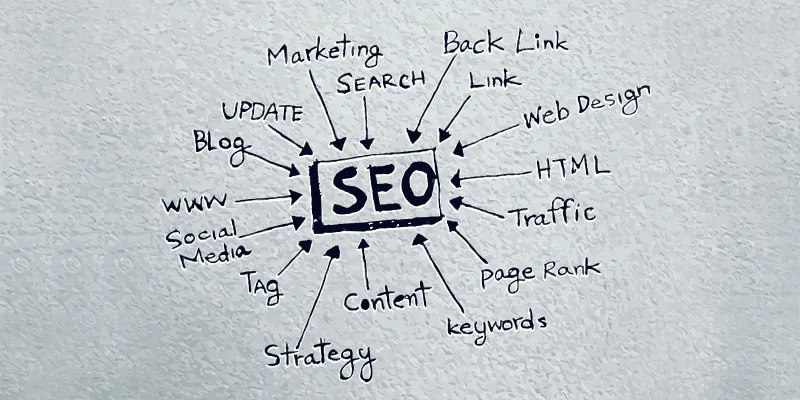Weighing the pros and cons of SEO for a startup
Most entrepreneurs understand the importance of SEO (search engine optimisation) and how it can lead to business growth. Without a doubt, SEO is important for any business of any size. But the question is -- does it make economic sense for a startup to use SEO as a business growth driver in its initial days?

Image credit "Shutterstock"
When I say ‘startup’, I’m talking about companies that have been newly launched-mostly bootstrapped or seed funded- and are trying to work out a repeatable and scalable business model that can not only generate money for operational and capital expenses, but also generate sufficient profit.
So does SEO make sense for these startups?
To answer this question, let us first try to understand what SEO entails. SEO is a process that enables websites to get more targeted traffic organically through search engines (such as Google, Bing,Yahoo & etc.),which may lead to a business goal.
A sound SEO strategy is based on:
- Deep understanding and analysis of business objectives
- Competition analysis
- Keyword analysis to understand search patterns
- Target demography and geography analysis
- Technical understanding and assessment of website
A thorough analysis is followed by a step-by=step execution of SEO strategy over a period of several months. It enables websites to drive more traffic organically depending on how competitive the segment is along with other factors.
SEO is not a quick game
As stated above, SEO best practices need to be implemented on a website as a continuous process. This is when the website will start seeing some organic love from Google. To increase website visitors or to increase Google rankings, you needs to invest several months on optimisation. This time period will depend on the local/global nature of the website, as well as the niche and competition. More competitive the niche, the longer it will take to rank.
SEO is not cheap
India is unfortunately infamous for being the black hat SEO capital of the world. Over the years, SEO players with little/no knowledge of SEO have not only brought down the quality of services, but also the cost of providing these services. Unfortunately, proper SEO cannot be provided for cheap.It requires thorough business and target market understanding as stated earlier.
Having briefly explained the process of SEO, I will highlight a few typical challenges of startups that can make SEO execution in initial days redundant, more time consuming and inefficient.
Typical challenges of startups
Longer time required to rank a new website
If the website is newly launched, SEO takes even longer. Once you start getting organic traffic, that is not the end of SEO, but rather a start to deeper, more holistic SEO engagement. The end objective of SEO is not to stop optmising when you starting ranking on top for your chosen keyword. Rather, your objective is to maintain your position, as well as look for ways to increase traffic to your site by targeting more keywords and content. So SEO is not a quick method to get customers.
Startups with newly launched sites don’t have Domain Authority
Domain Authority is one of the most important factors of SEO. Every domain gets a trust score from Google based on several factors (such as age, links from other quality sites, social shares, performance, content relevance,& etc.). Any new domain needs to earn some trust before it can start getting organic ranking boost. This makes the SEO process longer, tougher and thus more expensive for a startup.
Startups pivot their model frequently
We’ve been working with startups and one of the challenges we’ve seen is that startups frequently fine tune or pivot their value proposition based on market feedback or opportunity. However, SEO cannot pivot as quickly as the value proposition. Let’s say, you have targeted a keyword for your homepage and you’ve been working for three months optimising the page for that keyword. Now, after you pivot, your homepage becomes a gateway page and the keyword now needs to be optimised for a subpage. This requires a change in orientation in the way SEO was planned around the homepage. This will require fresh indexing, content creation, link-building and internal linking, which lengthens the time for SEO to show results.

Image credit "Shutterstock"
Disruptive Product/Service
Henry Ford famously said: “If I had asked people what they wanted, they would have said faster horses.” This applies to cases where you’re introducing a completely new product/service that people have never experienced before. Naturally, if they have never experienced it, it is unlikely that they would search for such a service on a search engine. In that scenario, SEO may not even be the right channel.
For most startups, the biggest challenges are lack of time, money and a repeatable and scalable model. They’re constantly fighting these battles. If a startup successfully conquers all three, it can go on to become a big company. As money and resources are limited, they need to see results as fast as possible.
This is exactly the opposite of what SEO is. SEO needs time and money and a clear business direction to deliver consistent high-quality results.
Does that mean startups should do away with SEO completely?
No, never, as you cannot afford to. The biggest benefit of a startup is that founders are running the show and they are the most passionate people. They have the will to learn and execute everything possible to make their startup a success. So in order to reap benefits of SEO, here is what I believe you should focus on:
- Learn basic SEO techniques - It will help you get visitors to your website organically. Especially if your website depends a lot on search engine traffic, this step is a must. Learn basics of keyword research, on-page SEO and content creation. Get your tech guy to optimise the performance of the site and make it mobile responsive.
- Keep writing blogs consistently - Blogs ensure that more people will find your business through search engines. Blog posts increase keyword density, thus they rank for various long tail keywords, which brings visitors to the site. Besides, blogs will increase engagement and help you position yourself as an authority. Create a quarterly plan for your content; measure the impact.
- Use Social Channels- To maximise reach to your target audience, use social channels. This will bring visitors to your site who will naturally link to you if they find your content interesting. This will result in getting more organic links to your site boosting SEO.
Other marketing channels you should focus on:
- Email Marketing is another cheap yet effective strategy
- Google PPC Campaigns makes sense for startups as you can calculate the revenue vs cost almost immediately. You can check whether PPC is affordable or not. As long as PPC Revenue is greater than or equal to PPC cost, the strategy is successful. It can definitely generate revenue and help you get the word out. But not all businesses can rely on it. You need to ensure that you’re selling something from your website and your PPC revenue covers your PPC cost. PPC can help in early validation of your product/service and get you feedback on your UX.
The challenge is to create effective PPC campaigns that can drive up the revenue and bring down the cost. Devising them requires good mastery over keyword research, landing page design, conversion funnel optimisation and effective ads creation. This is where experienced PPC folks come in, who might be costly. So, if a founder can spend some time to learn PPC basics, it will help.
Conclusion
SEO is an evergreen technique.It is often the most inexpensive way for getting leads/customers in the long run. Every business needs to consider SEO as a marketing channel. However, startups need to focus more on immediate strategies to generate revenue that can be subsequently invested in elaborate SEO techniques. Startup founders should learn basic SEO techniques, so that their websites adhere to fundamental SEO principles. Blogging is a powerful tool that should be used by startups to consistently drive organic traffic.
About the Author
Raunak Guha, Co-founder and CEO of RankHigher.in. An MBA graduate from Imperial College London, Raunak has been trying to create an SEO knowledge centre in India to help startups and small companies in organic growth.







